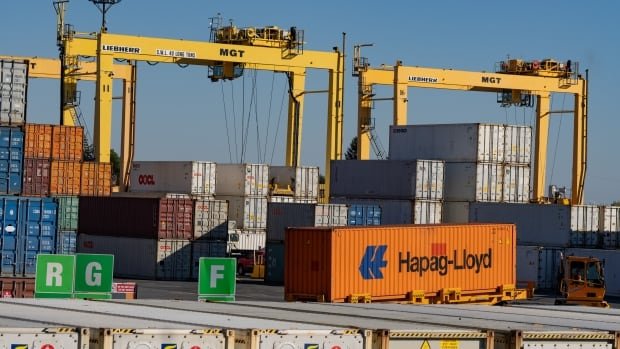If the lockout of dockworkers in Montreal persists, there will be “catastrophic” consequences for the Canadian economy, particularly in Quebec and Ontario, the local port authority warns.
On Monday morning, Port of Montreal CEO Julie Gascon held a news conference, less than 12 hours after the lockout began.
The lockout is the latest escalation in a labour dispute that has heated up in recent weeks. The Port of Montreal moves $400 million worth of goods every day and is Canada’s second busiest port after Vancouver, which is also mired in a labour dispute. A lockout also began there last Monday.
On Thursday, the Maritime Employers’ Association (MEA) tabled what it described as a final offer, which came with a 72-hour lockout notice.
The MEA threatened to lock out workers as of Sunday at 9 p.m. if they didn’t accept the offer.
The dockworkers overwhelmingly rejected the offer, with 99.7 per cent of members voting against it, according to a spokesperson for the Canadian Union of Public Employees.
Gascon said it’s only a “matter of days” before the effects of the lockout are felt on a daily basis by everyday people, not just the workers. She said the lockout directly affects 1,200 workers at the port, but 10,000 other workers who depend on the port’s flow of goods, like truck drivers and marine pilots, could also be caught in the dispute.
She also mentioned businesses, big and small, who rely on materials delivered through the port.
“Each container that is not moved here in Montreal is a missing piece in the Canadian economy,” Gascon said.
“Today, the lockout affects the logistics chain. Tomorrow, it’ll be the factories. After that, it’ll be the retailers.”
The union representing dockworkers, the Syndicat des débardeurs du port de Montréal, is expected to hold a news conference later this morning.
Some essential services like wheat transportation continue but most merchandise is frozen.
Roughly 1,200 dockworkers at the Port of Montreal rejected a deal Sunday evening, triggering a lockout at Canada’s second-busiest port. It added to a string of labour disruptions including a lockout at the Port of Vancouver and a looming Canada Post strike.
Pressure tactics
The collective agreement between the maritime employers and the dockworkers expired on Dec. 31, 2023.
The labour dispute ramped up in late September, when the workers rejected an offer and approved a strike mandate.
Dockworkers went on a three-day strike on Sept. 30, closing two terminals — Viau and Maisonneuve — that handle more than 40 per cent of the port’s container traffic.
Since Oct. 31, the union launched an indefinite strike that has shut down those two terminals.
The MEA has said its newest offer includes a three per cent salary increase each year for four years and a 3.5 per cent increase for the two subsequent years.
According to the MEA, the increases would bring a dockworker’s total average compensation package at the Port of Montreal to more than $200,000 per year at the end of the contract.
The association added that it is asking dockworkers to provide at least one hour’s notice when they will be absent from a shift — instead of one minute — to help reduce management issues “which have a major effect on daily operations.”
On Friday, an official with the dockworkers’ union said the new offer only contains “cosmetic changes” and doesn’t address issues about scheduling, a major sticking point in negotiations.


Leave a Reply